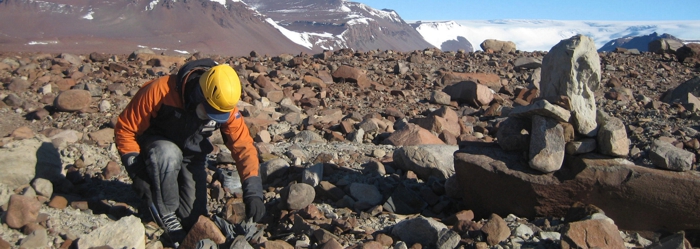Antarctic and ocean floor sedimentology
Modern and ancient sedimentary systems from Antarctica, the Southern Ocean and New Zealand provide important archives of changes in behavior of the ice sheets.

The geological record provides a first order constraint on the magnitude of earth system response to past changes in environmental boundary conditions, including atmospheric greenhouse gas concentrations. In his context, our aim is to investigate the response of the Antarctic Ice Sheet and adjacent Southern Ocean during rapid or large-scale climatic change events in the geological past.
Over the past five decades, the Antarctic Research Centre has been at the forefront of international efforts to drill at both the margins of the Antarctic Ice sheet and beneath it. Since the 1970's, we have pioneered the use of the drill systems capable of recovery high quality drill cores over a kilometre in length, beneath sea ice and ice shelves. These projects culminated in the Cape Roberts Project (1997-1999) and ANDRILL Program (2005-2007), which combined obtained an unprecedented deep archive of West and East Antarctic Ice Sheet variability in the Ross Sea over the past 34 million years.
Subsequent work has seen ARC researchers involved in the International Ocean Discovery Programme (IODP) expeditions to Wilkes Land (2010), and the outer Ross Sea (2018) to investigate ocean-ice sheet interactions during past periods of large-scale climatic variability. We are also leaders in the ambitious multi-disciplinary Ross Ice Shelf project, which seeks to obtain rare geological samples from beneath the world’s largest ice shelf. Our group also conducts extensive outcrop and drilling work in the Transantarctic Mountains, to investigate the terrestrial evolution of Antarctica’s ice sheet climate and biology.
This work includes the Friis Hill drilling project to examine paleoclimates and biology of the Transantarctic Mountains during the Middle Miocene Climate Optimum, and cosmogenic nuclide dating of glacial erratics are used to examine past glacial dynamics of Antarctica’s outlet glaciers since the Last Glacial Maximum. We also work on New Zealand records, with a focus on obtaining records of past sea level variations from the Wanganui Basin, and glacial chronologies from the Southern Alps and central North Island volcanoes.
Recent publications highlights the wide range of geological and paleoclimate research conducted by the ARC:
- Initiation and evolution of the first Antarctic Ice Sheets (URL)
- Reconstruction of oceanic change to identify the extent of polar amplification during past periods of global warmth (URL)
- Orbital-scale variability of the Antarctic Ice sheet during past warm climates (URL)
- LGM to recent marine records of Antarctic ice sheet retreat (URL)
- LGM to recent terrestrial records of Antarctic ice sheet retreat (URL)
- LGM to recent deglacial records from central North Island volcanoes (URL)
People involved
Current funded research projects
- RSNZ Marsden Fund Council Award: Macromolecular Rate Theory (MMRT) and the temperature-dependence of terrestrial biosphere over time and space - B. Duncan (co-PI), T. Naish (AI), N. Bertler (AI).
- RSNZ Marsden Fund: Antarctic ice sheet interactions with the ocean during past warm climates - R. McKay (PI)., B. Duncan (AI).
- RSNZ Rutherford Postdoctoral Fellowship: Antarctic climate and flora in a warmer world: A geological perspective using molecular fossils - B. Duncan (PI).
Current PhD students
